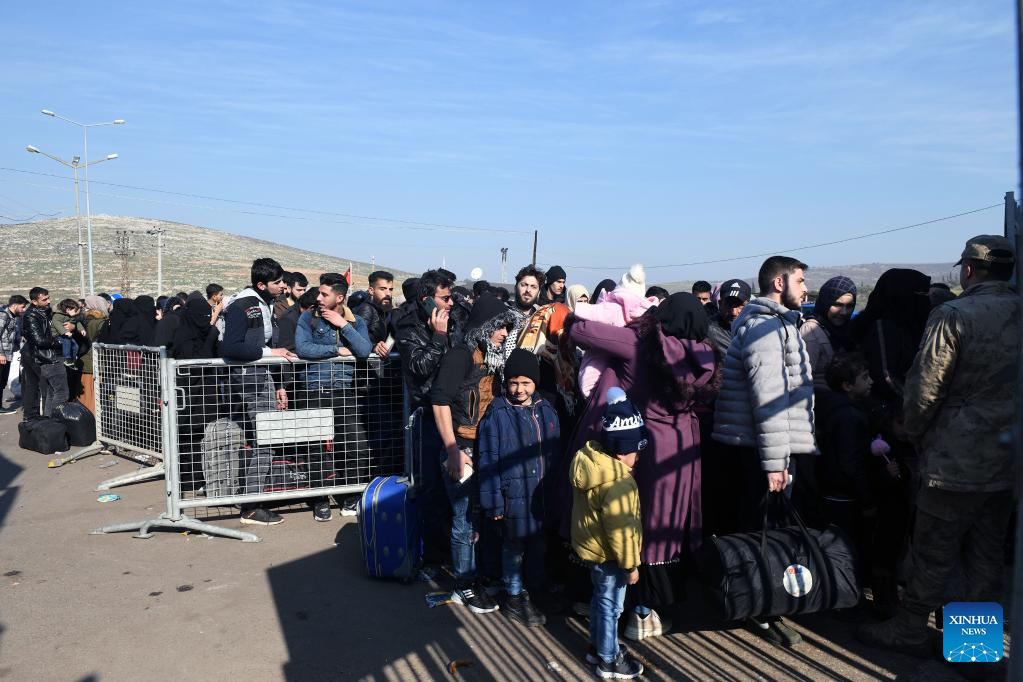
Syrians wait to get through a border gate on their way back to Syria after major earthquakes in Hatay, Türkiye, March 2, 2023.(Photo by Mustafa Kaya/Xinhua)
by Burak Akinci
ANKARA, March 4 (Xinhua) -- Already a vulnerable community, Syrian refugees in Turkiye face in the wake of killer earthquakes the dilemma of returning home or trying to survive in increasingly tough conditions in their host country.
"We had to evacuate to Ankara, as returning to Syria was not an option for my family because conditions are worse there," Ahmad, a Syrian refugee who declined to give his surname due to security concerns, told Xinhua.
"But there are many uncertainties here as well, such as housing and employment," he spoke from a friend's house in the Turkish capital city.
Ahmed used to be a factory worker in Hatay, a southern Turkish border province that hosted a sizeable Syrian diaspora population, until the disaster took away a family member, toppled his workplace like hundreds of others, and left him jobless.
The catastrophe prompted him to join the rank of hundreds of thousands of quake survivors moving some 700 km westward to take refuge in Ankara.
Burcak Sel Tufekci, an Ankara-based humanitarian worker, said Syrians fleeing from the quake zones are now living packed in high numbers in flats in Ankara and other cities.
"Everyone is disadvantaged in regions affected by the quakes, however, the refugees are the most disadvantaged of all," living in particularly difficult conditions, said Tufekci, general coordinator of the international aid organization Earth's World.
The organization estimated that there were some 500,000 displaced earthquake survivors in Ankara, some 100,000-150,000 of whom are Syrians, Tufekci told Xinhua in an interview.
Turkey shelters over 3.6 million Syrians and is the world's largest refugee-hosting country, granting many of them access to social services, residency, and employment permits.
Following the earthquakes, the Turkish government loosened restrictions on refugees' internal travel to make it easier for them to settle in camps and localities outside the disaster zones.
Tufekci called on the international community to urgently step up refugee relief efforts.
"Turkiye has done the utmost for these people, but now it needs international assistance to reach out to its refugee community. This situation cannot be handled by Turkiye alone," she added.
More than 50,000 people have confirmed died in the massive earthquakes that hit both Türkiye and Syria on Feb. 6, the worst disaster the region has seen in a century.
In the absence of official figures, it is unknown how many Syrian refugees have died in the quakes in Türkiye.
Earth's World estimated that 4,000 Syrians lost their lives in Turkish quake zones, while some 50,000 surviving refugees have returned to Syria.
Turkish Defense Minister Hulusi Akar said last week that 30,000 Syrian nationals were moving back home following the quakes, as they seemingly found life more difficult in Türkiye's quake-hit regions.
The disaster also reportedly flared up anti-refugee sentiments in Turkiye when the locals were struggling amid serious economic woes.
Some Turks blamed those refugees who are willing to work at a low wage for depriving them of job opportunities. Others complained that the refugee influx has led to increases in crime rates and government spending on social services.
The tragedy added to tensions as many social media users lashed out at Syrians, calling them to leave Turkiye en masse.
"Unfortunately, we heard in the first days of the disaster an anti-Syrian rhetoric taking place in the earthquake zones and also on social media. There is also a serious fear in the refugee community," Tufekci said.
Ahmad echoed these feelings but said that people had been generally kind to him and his family in Ankara.
"We consider Turkiye as our adopted homeland. We don't want any trouble," he added. ■



